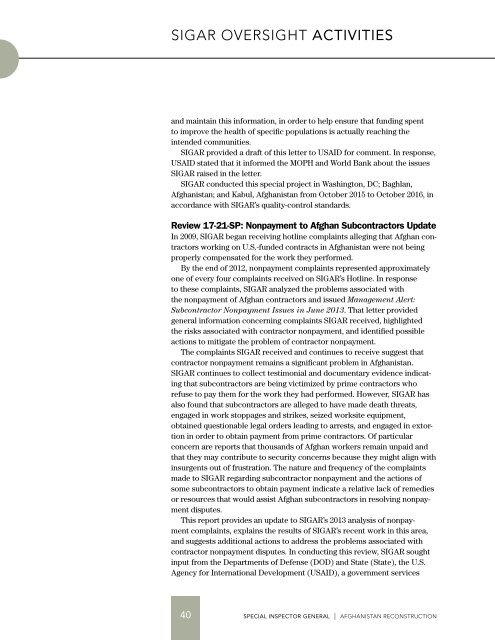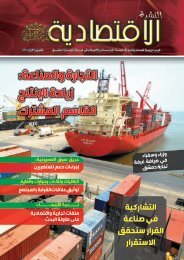SIGAR
2017-01-30qr
2017-01-30qr
You also want an ePaper? Increase the reach of your titles
YUMPU automatically turns print PDFs into web optimized ePapers that Google loves.
<strong>SIGAR</strong> OVERSIGHT ACTIVITIES<br />
and maintain this information, in order to help ensure that funding spent<br />
to improve the health of specific populations is actually reaching the<br />
intended communities.<br />
<strong>SIGAR</strong> provided a draft of this letter to USAID for comment. In response,<br />
USAID stated that it informed the MOPH and World Bank about the issues<br />
<strong>SIGAR</strong> raised in the letter.<br />
<strong>SIGAR</strong> conducted this special project in Washington, DC; Baghlan,<br />
Afghanistan; and Kabul, Afghanistan from October 2015 to October 2016, in<br />
accordance with <strong>SIGAR</strong>’s quality-control standards.<br />
Review 17-21-SP: Nonpayment to Afghan Subcontractors Update<br />
In 2009, <strong>SIGAR</strong> began receiving hotline complaints alleging that Afghan contractors<br />
working on U.S.-funded contracts in Afghanistan were not being<br />
properly compensated for the work they performed.<br />
By the end of 2012, nonpayment complaints represented approximately<br />
one of every four complaints received on <strong>SIGAR</strong>’s Hotline. In response<br />
to these complaints, <strong>SIGAR</strong> analyzed the problems associated with<br />
the nonpayment of Afghan contractors and issued Management Alert:<br />
Subcontractor Nonpayment Issues in June 2013. That letter provided<br />
general information concerning complaints <strong>SIGAR</strong> received, highlighted<br />
the risks associated with contractor nonpayment, and identified possible<br />
actions to mitigate the problem of contractor nonpayment.<br />
The complaints <strong>SIGAR</strong> received and continues to receive suggest that<br />
contractor nonpayment remains a significant problem in Afghanistan.<br />
<strong>SIGAR</strong> continues to collect testimonial and documentary evidence indicating<br />
that subcontractors are being victimized by prime contractors who<br />
refuse to pay them for the work they had performed. However, <strong>SIGAR</strong> has<br />
also found that subcontractors are alleged to have made death threats,<br />
engaged in work stoppages and strikes, seized worksite equipment,<br />
obtained questionable legal orders leading to arrests, and engaged in extortion<br />
in order to obtain payment from prime contractors. Of particular<br />
concern are reports that thousands of Afghan workers remain unpaid and<br />
that they may contribute to security concerns because they might align with<br />
insurgents out of frustration. The nature and frequency of the complaints<br />
made to <strong>SIGAR</strong> regarding subcontractor nonpayment and the actions of<br />
some subcontractors to obtain payment indicate a relative lack of remedies<br />
or resources that would assist Afghan subcontractors in resolving nonpayment<br />
disputes.<br />
This report provides an update to <strong>SIGAR</strong>’s 2013 analysis of nonpayment<br />
complaints, explains the results of <strong>SIGAR</strong>’s recent work in this area,<br />
and suggests additional actions to address the problems associated with<br />
contractor nonpayment disputes. In conducting this review, <strong>SIGAR</strong> sought<br />
input from the Departments of Defense (DOD) and State (State), the U.S.<br />
Agency for International Development (USAID), a government services<br />
40<br />
SPECIAL INSPECTOR GENERAL I AFGHANISTAN RECONSTRUCTION







